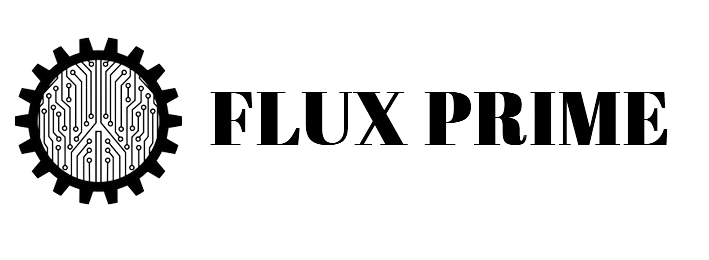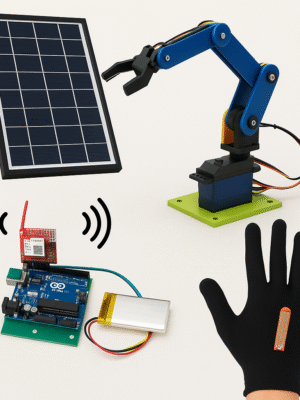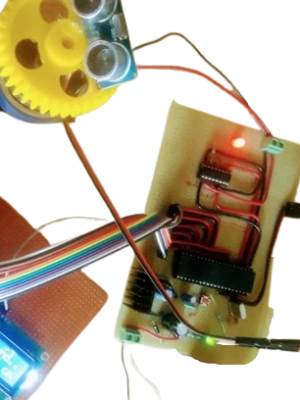Description
⚙️ Project Overview
The BLDC Motor-Based Regenerative System is an innovative engineering project that focuses on energy recovery and reusability from rotating systems.
In conventional motor setups, energy is wasted as heat during braking or slowdown. This system captures that otherwise lost kinetic energy and converts it into usable electrical power to charge a battery or reuse within the circuit.
This regenerative braking concept is widely used in electric vehicles (EVs), hybrid cars, elevators, and wind turbines — and this prototype gives students practical insight into how regenerative systems work using BLDC motors and power electronics.
🔋 Working Principle
The project uses a Brushless DC (BLDC) motor as both a motor and a generator depending on operating mode.
-
Motor Mode:
When powered, the BLDC motor runs the load normally. A power control circuit drives the motor through MOSFET-based switching or ESC (Electronic Speed Controller). -
Regenerative Mode:
When the motor slows down or is externally driven (like deceleration), it acts as a generator.
The generated electrical energy is rectified using a diode bridge and then directed to charge a battery or feed back to a capacitor bank. -
Energy Storage & Monitoring:
The recovered energy is displayed on an LED or LCD monitor, showing how regenerative systems can extend battery life and reduce power wastage.
This demonstrates the core principle behind regenerative braking and smart energy feedback.
⚙️ Block Diagram Description
Main Blocks:
-
BLDC Motor (Dual Role: Motor/Generator)
-
Driver Circuit (ESC or MOSFET-based)
-
Regenerative Rectifier and Control Circuit
-
Battery Charging Module
-
Voltage & Current Sensing Modules
-
Display / Indicator (LED or LCD)
-
Power Supply (12V DC or Li-ion Battery)
🔩 Key Features
-
Demonstrates real-world regenerative braking concept.
-
Uses BLDC motor for efficient energy conversion.
-
Recovers energy during slowdown or back-drive conditions.
-
Compact and easy-to-understand layout.
-
Includes LED indicators for battery charge status.
-
Fully microcontroller compatible – expandable to Arduino/STM32.
-
Ideal for academic learning and EV demonstration.
🧰 Technical Specifications
| Parameter | Specification |
|---|---|
| Motor Type | Brushless DC Motor (BLDC) |
| Operating Voltage | 12V DC |
| Power Rating | 30–100W (based on motor) |
| Control Type | PWM / ESC Motor Driver |
| Regeneration Output | 5V–12V DC (depending on RPM) |
| Energy Storage | 12V Battery or Capacitor Bank |
| Display Type | LED / 16×2 LCD |
| Controller (Optional) | Arduino / Microcontroller Interface |
| Protection | Reverse Polarity, Overload Protection |
| Efficiency | ~75–85% Energy Recovery (Prototype) |
🎓 Educational Outcomes
Students will gain hands-on knowledge in:
-
Regenerative energy recovery using BLDC motors.
-
Principles of regenerative braking and dynamic power conversion.
-
Motor control using PWM signals and driver circuits.
-
Designing battery charging circuits for recovered energy.
-
Understanding dual-mode operation of motors (motor/generator).
This project is ideal for Electrical, Electronics, and Mechanical Engineering students focusing on green energy systems, power electronics, and EV technology.
💡 Applications
-
Electric Vehicle (EV) regenerative braking simulation.
-
Hybrid vehicle energy recovery systems.
-
Renewable energy & power optimization models.
-
Smart grid and motor energy research projects.
-
Educational demonstration for sustainable energy systems.
🧩 Advantages
-
Saves and reuses energy efficiently.
-
Reduces energy wastage during braking.
-
Improves battery performance and lifespan.
-
Cost-effective learning kit for energy and control systems.
-
Compact, durable, and easy to demonstrate in labs.
📦 Package Includes
-
BLDC Motor with Driver Circuit
-
Regenerative Rectifier Module
-
Energy Storage Battery (Rechargeable)
-
LED or LCD Display Board
-
Power Supply (12V Adapter)
-
Arduino-Compatible Control Circuit (optional)
-
Documentation (Word + PDF)
-
Circuit Diagram & Block Diagram Image
-
User Manual & Assembly Instructions



















